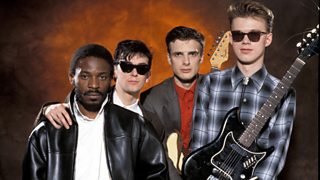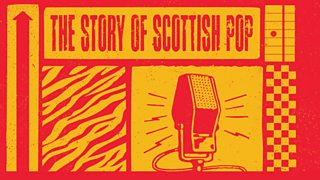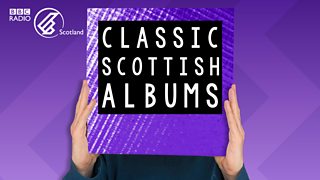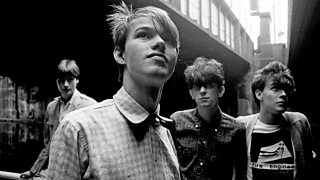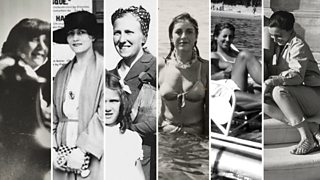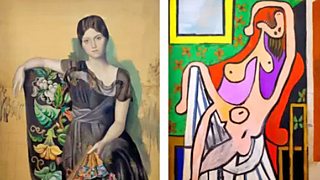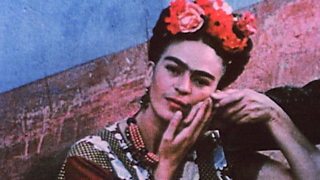The magnificent eleven: Songs that define Scottish pop
19 June 2018
The first major exhibition on Scotland's pop music, Rip It Up, is accompanied by a three-part 大象传媒 TV series with digital and radio content bringing another dimension to the story. Get in the mood with ALASTAIR McKAY'S eleven defining moments from the Scottish songbook.

Asking a song to sum up a culture is a heavy duty task. Songs don’t work like that, unless they’re anthems, and even then, not often.
Asking a song to sum up a culture is a heavy duty task. Songs don鈥檛 work like that, unless they鈥檙e anthems, and even then, not often.
Nationalism doesn’t make for good pop music, as Andy Cameron proved with Ally’s Tartan Army, his dire musical summary of that cultural Darien Project, the 1978 World Cup.
But as , the exhibition at the National Museum of Scotland suggests, pop can move mountains. This entirely arbitrary Top 11 includes artists who have scaled the peaks of international success, and others who re-drew the map with their stubborn individuality.
There are significant omissions, of course. But all are magnificent in their own way.
Rip It Up
-
![]()
Blazing a Trail
The first episode looks at the musical mavericks who invented early Scottish pop. 大象传媒 Two Scotland, Tuesday at 21:00.
-
![]()
Take this quiz to test your knowledge of Scottish pop music.

Young Fathers - Get Up official video, 2014. (Third party content may contain adverts)
Possibly the most exciting band at work in Scotland today, Leith’s Young Fathers’ appeal is based on their energy, and the fact that they sound like an unresolved argument between musical genres. The stand-out track from their 2014 Mercury winning album Dead is a rap, a call to arms, and party anthem, suspended over a drumbeat and a melody like a jammed car alarm.

Bert Jansch - Needle of Death, 1965. (Third party content may contain adverts)
Glasgow-born, raised in Edinburgh, Jansch’s guitar playing is eternal. A ferociously inventive guitarist, both solo and with Pentangle, his song Blackwaterside was reworked without credit by Led Zeppelin as Black Mountain Side, while this song, his pained response to the death of his friend, Buck Polly, inspired Neil Young’s . Jansch didn’t like playing it, though hecklers requested it. “Usually junkies,” he said, “and usually, funnily enough, Scotsmen.”

Lulu performs Shout on French TV in 1966. (Third party content may contain adverts)
Marie Lawrie, aka Lulu, is that very Scottish thing, a successful artist whose reputation was tarnished by her popularity. The “rare wee chanter” was the toast of when she performed her debut single Shout, the release of which had to be delayed until she could leave school at 15. Musically, the soulful declamatory yell was hard to maintain, but Lulu recorded at Muscle Shoals with Jerry Wexler, Tom Dowd and Arif Mardin, and worked with David Bowie and Mick Ronson, as well doing a Bond theme and a Eurovision entry.

Average White Band play Pick Up the Pieces at Montreaux, 1977. (Third party content may contain adverts)
Dundee’s reputation as a soul-loving town is in part due to the Average White Band, who scored a 1975 number one in the USA with this irresistibly funky instrumental, which sounds like James Brown’s band doing a cop-show theme. Recorded in Miami with legendary producer Arif Mardin, it was propelled by drummer Robbie McIntosh and became viewed as a tribute to him after he died at a Hollywood party in September 1974. Songwriter and guitarist Hamish Stuart said, "So Robbie didn’t live to see it go to No 1 in America a few months later. He was such a character, the magnet that brought us together... it went from being a song about being skint to being a song about Robbie."

The Sensational Alex Harvey Band - Midnight Moses, 1973. (Third party content may contain adverts)
The career of Alex Harvey showed the development of rock and roll. He won a contest to be named Scotland’s Tommy Steele, honed his chops in Hamburg, shared bills with the nascent Beatles, he played in the pit band for the hippie musical Hair, and blended all of this into SAHB, for whom he was the fearlessly theatrical frontman. His ferocious charisma comes out in Midnight Moses, a thunderous blues tune on which Harvey all-but invents AC/DC.

Bay City Rollers - Summerlove Sensation, 1974. (Third party content may contain adverts)
Rollermania was real. The boy band managed by a potato merchant of uncertain reputation from Prestonpans were huge on both sides of the Atlantic, and big in Japan, despite - because of - their tartan-fringed bootboy fashion and their easy way with a pop tune, none lovelier than this sunny stomper written by Phil Coulter and Bill Martin. Martin is one of the most successful Scottish songwriters ever. If the Rollers had stuck with him, they could have extended their shelf life with The Bump (a hit for Kenny) and Forever and Ever (a whopper for Slik, featuring Midge Ure).

The Rezillos - Can't Stand My Baby, 1977. (Third party content may contain adverts)
Arguments rage about which was the most significant record of the punk period. is claimed by some as Scotland’s Anarchy In The UK. But it’s hard to resist the frenetic charms of the Rezillos’ debut, which replaced punk nihilism with teen-beat frenzy. The group’s vocalists, Eugene Reynolds (quiff) and Fay Fife (vinyl mini-dress) were comic book cute, and main songwriter Jo Callis had an instinctive grasp of pop dynamics which he took to the Human League.

Orange Juice - Blue Boy video featuring West Princes Street in Glasgow's West End; Postcard Records was famously run by Alan Horne from a tenement flat on the street. (Third party content may contain adverts)
The mythology surrounding Glasgow’s Postcard Records grows thicker by the year, and its short roster (Aztec Camera, Josef K, Go-Betweens) is full of angular, off-kilter brilliance. Perhaps the label’s finest moment is Blue Boy, the second single by Edwyn Collins’s group Orange juice. Even now, it’s hard to understand how it hangs together in a jittering, saccharine rush that manages to merge Chic guitars and the alien swagger of the Velvet Underground.

The Associates - Party Fears Two, 1982. (Third party content may contain adverts)
In Billy Mackenzie, The Associates had one of the great singers, but the operatic Dundonian was so versatile that he sometimes struggled to find a way to utilise his talent. His best work was done with the multi-talented Alan Rankine, and he was never better than on Party Fears Two - a joyous, haunting tune which hides a dark message about social alienation beneath an irresistible pop hook.

The Proclaimers perform Sunshine on Leith to an appreciative crowd at T in the Park in 2015.
Often mistaken for a novelty act on account of being twins with glasses, Craig and Charlie Reid fuse gospel fire, punk energy and the lyrical directness of country music. They may be best known for I’m On My Way and I’m Gonna Be (500 Miles) - both appeared on film soundtracks - but their most majestic moment is Sunshine on Leith, a restorative hymn in which God’s glory is located in the skyline East of Edinburgh.

Garbage - Only Happy When It Rains live at Glastonbury Festival in 2005. (Third party content may contain adverts)
The Wisconsin-based studio project coordinated by Nirvana producer Butch Vig can’t be classified as being wholly Scottish, but by recruiting Edinburgh singer Shirley Manson they imported the Scottish climate. Manson became an adept role model for post-grunge misfits, even poking fun at the left-field miserabilism of the scene in lyrics which nod to a similarly unsunny .
Stories of Scottish Pop
-
![]()
Watch Rip It Up on 大象传媒 iPlayer
From Skiffle to Hip-Hop and almost everything in between.
-
![]()
The Story of Scottish Pop on radio
Rock, Pop, Dance and Alternative - it's all here.
-
![]()
Scottish Classic Albums podcast
Take a deep-dive with this decades-spanning podcast.
-
![]()
The story of Scotland's post-punk music scene.
More from 大象传媒 Arts
-
![]()
Picasso鈥檚 ex-factor
Who are the six women who shaped his life and work?
-
![]()
Quiz: Picasso or pixel?
Can you separate the AI fakes from genuine paintings by Pablo Picasso?
-
![]()
Frida: Fiery, fierce and passionate
The extraordinary life of Mexican artist Frida Kahlo, in her own words
-
![]()
Proms 2023: The best bits
From Yuja Wang to Northern Soul, handpicked stand-out moments from this year's Proms

